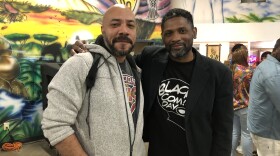In the last week, more than 200 veterans have volunteered to attend immigration hearings with Afghans who worked with U.S. forces during the 20-year war in Afghanistan, according to Kyleanne Hunter, CEO of Iraq and Afghanistan Veterans of America.
IAVA and nonprofit #AfghanEvac partnered on the Battle Buddies initiative after the June 12 arrest of Sayed Naser, a former Afghan interpreter, after his San Diego asylum hearing.
"This isn't political," Hunter said at a Monday news conference. "This is personal. For many of us, these are people that we served with."
About 200,000 Afghans relocated to the U.S. after Afghanistan fell to the Taliban in August 2021, according to #AfghanEvac, a nonprofit that helps resettle Afghans.
Naser and his brother fled Afghanistan in 2023 after the Taliban killed another one of his brothers at a family wedding, according to his asylum request papers. He arrived in the United States in 2024, crossing at the San Ysidro Port of Entry via the CBP One app.
Two months ago, Naser's brother was granted asylum, with the same story and documentation Naser provided, said his attorney, Brian McGoldrick.
But on Thursday, an immigration judge dismissed Naser's asylum case, placing him in "expedited removal" status. His attorney said Naser will have a "credible fear" interview with an asylum agent to determine whether he can reapply for asylum.
If the agent determines that his fear isn't credible, Naser can be deported. McGoldrick said they'd appeal a negative decision.
The interview hasn't been scheduled, McGoldrick said Monday.
Naser's case has galvanized a community that came together in 2021 to help get former U.S. allies in Afghanistan out of the country.
Shawn VanDiver, the San Diego Navy veteran who co-founded #AfghanEvac, said all the Afghans who came to the U.S. since 2021 were vetted and approved to come.
"(The Department of Homeland Security) has said Sayed was not vetted, DHS has said that there's no evidence that Sayed served alongside our country," VanDiver said Monday. "Both of those things are lies — knowable lies. They know that they're not telling the truth."
Employment and contracting records obtained by KPBS indicate that Naser and his brothers worked with the U.S. military during the occupation.
KPBS sent DHS a list of questions about the case on Friday. The agency has not replied.







